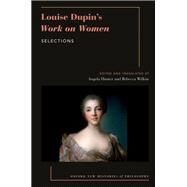- ISBN: 9780190090104 | 0190090103
- Cover: Paperback
- Copyright: 7/21/2023
The eighteenth-century text Work on Women by Louise Dupin (also known as Madame Dupin, 1706-1799) is the French Enlightenment's most in-depth feminist analysis of inequality--and its most neglected one. Angela Hunter and Rebecca Wilkin here offer the first-ever edition of selected translations of Dupin's massive project, developed from manuscript drafts. Hunter and Wilkin provide helpful introductions to the four sections of Work on Women (Science, History and Religion, Law, and Education and Mores) which contextualize Dupin's arguments and explain the work's construction--including the role of her secretary, Jean-Jacques Rousseau.
Dupin's central claim in Work on Women is that French jurists have gradually disenfranchised women through reductive interpretations of Roman law. As a result, modern marriage is founded on an abusive, illegitimate contract that enriches one party and impoverishes the other. This manifest injustice is enabled by the "masculine vanity" that aggrandizes men, diminishes women, and distorts all realms of knowledge. Dupin shows how the most reputable scientists incorporate old notions of women's weakness into new understandings of the body, while historians denigrate female rulers or erase them altogether. Even in everyday conversation, men assert their entitlement to social dominance through casual misogyny. Thus, although Dupin advocates for meaningful education for girls, she insists that the upbringing of boys must also be reformed.
This volume fills an important gap in the history of feminist thought and will appeal to readers eager to hear new voices that challenge established narratives of intellectual history.
Dupin's central claim in Work on Women is that French jurists have gradually disenfranchised women through reductive interpretations of Roman law. As a result, modern marriage is founded on an abusive, illegitimate contract that enriches one party and impoverishes the other. This manifest injustice is enabled by the "masculine vanity" that aggrandizes men, diminishes women, and distorts all realms of knowledge. Dupin shows how the most reputable scientists incorporate old notions of women's weakness into new understandings of the body, while historians denigrate female rulers or erase them altogether. Even in everyday conversation, men assert their entitlement to social dominance through casual misogyny. Thus, although Dupin advocates for meaningful education for girls, she insists that the upbringing of boys must also be reformed.
This volume fills an important gap in the history of feminist thought and will appeal to readers eager to hear new voices that challenge established narratives of intellectual history.







